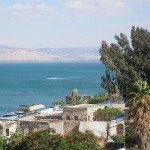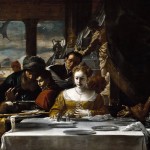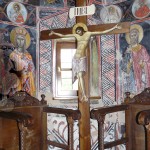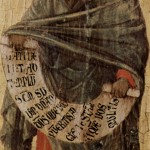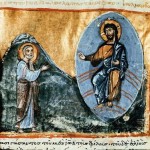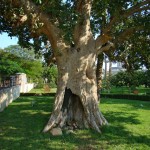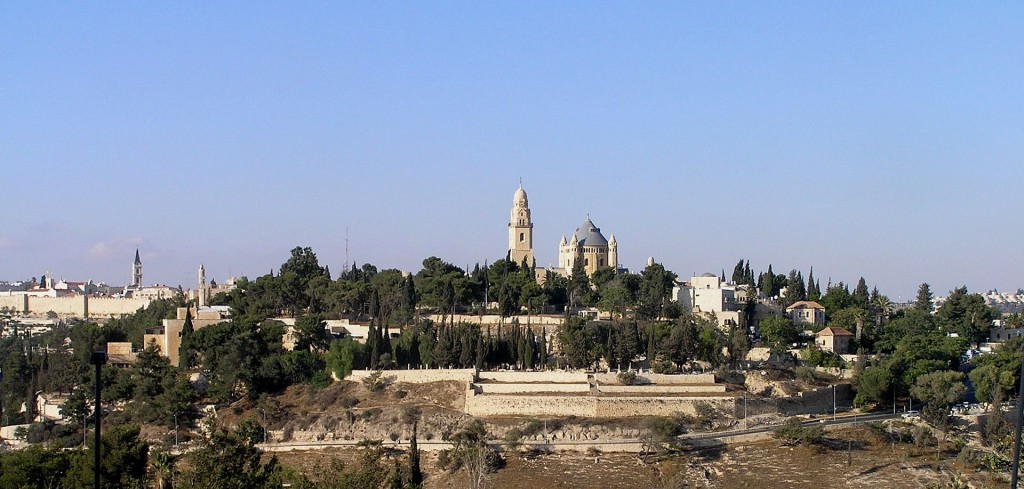
2 Samuel 5:1-5, 9-10 and/or Ezekiel 2:1-5
What It’s About: The 2 Samuel text is about David’s ascension to the throne and an overview of his reign; the Ezekiel text is an account of a prophetic call and charge. Both of these are ways of describing how God insinuates God’s presence into the midst of the people. Kingship was a major way that the divine was mediated to the people, and kings like David were presumed to have an especially close relationship to God, and to receive advice and aid from God. The prophets were not always so straightforwardly aligned with the national machinery, but they still represented God’s voice calling out in the midst of the people. In both of these texts, we have the voice of God breaking into common life.
What It’s Really About: These passages are about two of the three major ways that the Israelites understood God’s voice and presence to be exhibited–at least in official, textual accounts. Prophet, priest, and king is a familiar triad, and here we have two of those three in view. These ways of finding God’s presence were woven into the fabric of everyday life for the Israelites (again, at least officially and textually).
What It’s Not About: It’s not about 2 Samuel 5:6-8, which describes the way David came to possess Jerusalem. It’s easy to see why these verses were left out, but reading them does help to make sense of verse 9, in which David is seen as occupying the city.
Maybe You Should Think About: In the wake of President Obama’s moving eulogy for Clementa Pinckney, it might be interesting to think about the way the bible describes David. David is especially close to God, “after God’s own heart,” and seemingly attuned to the will of God in powerful ways. Is that what we want from our leaders? Some say yes, and some say no, and President Obama’s eulogy was probably the most forthrightly religious speech from a sitting president in a generation. What do we make of that?
What It’s About: This is a psalm to Zion, the city and mountain of God.
What It’s Really About: This psalm really underscores a couple of things: national strength and national identity with God. These two things are connected in the city of Jerusalem (Zion), the geographical place where God’s presence was most keenly felt and God’s security was most fully realized. Zion is seen as an impregnable fortress before which the kings of the earth flee. There was a concept in antiquity called axis mundi that held that there was a kind of umbilicus for the world–a spot where the earth and heaven could nearly touch and where the divine was accessible to humans. Jerusalem was this for the Israelites; it was the spot on the earth where God was most near. This psalm communicates that proximity and the comfort that God’s presence can bring.
What It’s Not About: This psalm is not as much about the temple as you might expect–although the temple does make an appearance in verse 9. We tend to think of Jerusalem as one big temple complex, with the temple and its concerns dominating the city. But this psalm paints the city itself heroically, with the city’s own architecture and geology making up the source of its strength. It’s a different way to think about what was important about the city of Jerusalem.
Maybe You Should Think About: Summer sometimes seems to be a time of pilgrimage for people. Folks take trips to places and spaces that are sacred to them in one way or another: to relatives’ homes, to favorite beaches or lakes, to summer camps or cookouts with friends. These kinds of experiences will be familiar to many, and that might be a good way to introduce what Jerusalem meant to people like this psalmist. Many people have sites of great importance, where they return to again and again because of the meaning layered onto them. That’s not too far from what this psalm is describing.
What It’s About: This is a marvelous passage, and a splendid mystery. There are passages like this hidden away in Paul’s letters–places where strange things are embedded in the text that you might not notice or think about very often–but things that, when confronted with them, you have to account for. Here we have what seems to be an account of a mystical experience, maybe Paul’s own or maybe someone else’s, and then also an account of an affliction visited upon Paul, a “thorn in the flesh” that keeps him from complacency. The revelations that stemmed from this experience are too wonderful to tell, Paul says, but they nevertheless produce wonder and humility in the apostle.
What It’s Really About: The Jewish Annotated New Testament (which you should buy if you don’t already have it) has really helpful notes on this passage. The notes there take this as a self-reference–a kind of humble way of relating one’s own special experiences without being too showy about it. I think that makes sense; Paul is telling about his own mystical experience in an almost reverential kind of way, recognizing that they are ultimately inaccessible to anyone else. That then helps to make sense of the bit about the thorn in the flesh, which follows after. The thorn, in verse 7, was to keep Paul from being too overtly boastful or self-satisfied about his special knowledge.
What It’s Not About: There are probably a thousand explanations for Paul’s thorn in the flesh. People have suggested everything from gout to homosexuality, from impotence to baldness to epilepsy to…an actual thorn, stuck in his flesh. This is definitely one of those things that we will never know for sure, but it almost doesn’t matter, does it? It’s not about what the thorn is, but it’s about the function of the thorn for Paul. The thorn works to set Paul off-balance, to counter some of his self-confidence and self-satisfaction, of which he had plenty. In that regard, the thorn is a placeholder for human frailty and fragility. Most of us know what he means; most of us have our own fleshly thorns. Paul, here, is saying that he is reminded daily of his own mortal nature.
Maybe You Should Think About: Sharing mystical experiences is always difficult. Over the years, I’ve had several people try to convince me of their experiences, and it always kind of falls flat. And I’ve had my own–nothing as dramatic as Paul’s, but still, things that felt very real and dramatic to me in the moment. But describing those to others is always hard, and sometimes they can come across as hokey. But a few years ago, I started trying something. Whenever the topic would come up in a bible study or in conversation, I would simply ask–usually groups of church folks, but sometimes broader groups–whether anyone had ever had experiences like this. I’ve been astonished; usually 1 or 2 out of every group of 20 will raise their hand. Often they are hesitant to share, knowing that they will sound ridiculous, but sometimes they are also glad to share, and glad to be listened to. So, maybe try to find a way to ask about those experiences. During a sermon, ask people to share them in writing at a prayer station, or in some small group setting. Or find another small group setting to ask about these experiences. Over a few years of trying this, I haven’t really gained access to anyone else’s experiences, but I’ve gained a great appreciation for the fact that a lot of people do have these experiences–and that has changed the way I think about them.
What It’s About: This is the story of Jesus’ homecoming, when he returned to where he had grown up and tried to be Jesus there. It didn’t go too well! His teaching was interrupted by the incredulity of his old friends and neighbors, who just couldn’t believe that Yeshua from down the street had come back talking like this. To me, the most interesting verse in the whole passage is verse 5: “He could do no deed of power there.” This is a familiar sensation to many, who return to homes and families and friends that belong to another phase of life, only to find that they don’t really belong there anymore. Jesus seems to have been dramatically changed by whatever had transpired between his departure and return, and this change left him distant from those he used to know. And that distance made it almost impossible for him to be who he was everywhere else.
What It’s Really About: There is an interesting geographical hinge in this passage. Verses 1-6 are about gathering inward, toward Jesus’ hometown. And verses 7-13 are about going outward again, to “the villages” and beyond where Jesus sent the twelve. It’s almost as if Jesus needed to go home, to the center of his life, to be able to progress outward from that point–even if that central point itself wasn’t fertile ground for his work.
What It’s Not About: A lot of folks seize on verse 3 as a kind of “gotcha” verse to challenge the perpetual virginity of Mary. Mark seems to know nothing about a doctrine of the virgin birth, or doesn’t care to communicate it here or anywhere else. For many, the mention of brothers and sisters is evidence that the whole thing is hooey. My personal opinion: who cares? I mean–I know a lot of people care. But I just can’t bring myself to care. The virgin birth is one of those aspects of Christian theology that everyone seems to agree is important, but I can’t for the life of me figure out why. It’s just not important to me. I get that it is important to others, and that’s great, but this passage doesn’t threaten me or elate me in the way it seems to do for others. So Jesus had brothers and sisters? OK.
Maybe You Should Think About: What is it that makes Jesus so relatively powerless? Is it the disbelief of those around him, as the text seems to suggest? If so, that’s a pretty fascinating account of the source of Jesus’ power. Is it embarrassment at people thinking ill of him? Again, that’s interesting. Even with the caveat that Mark’s Jesus is the most human Jesus of the four gospels, this is an awfully frail moment for Jesus. Why does he lose so much strength in this place?

